It’s a story of extremes; missed opportunities, addiction and family dysfunction alongside critical acclaim, reconciliation and redemption. Ten years after his death, Bryan MacLean is deeply missed by those who knew him, and those who only knew him through his music.
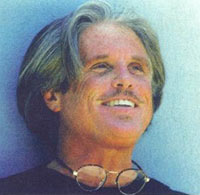 My initial conversation with MacLean’s mother, Elizabeth McKee, focused on her son, but quickly grew to include other family members; she and Bryan’s half-sister, singer Maria McKee, each played an integral role in his professional and personal life.
My initial conversation with MacLean’s mother, Elizabeth McKee, focused on her son, but quickly grew to include other family members; she and Bryan’s half-sister, singer Maria McKee, each played an integral role in his professional and personal life.
Belying her age – 82 years – Elizabeth was energetic, focused, and willing to talk for hours at a time, especially regarding her children, whom she clearly adores.
Family lineage practically guaranteed Bryan MacLean would possess an artistic disposition. “I’m an artist, my father was an artist, and my mother had been on the stage,” Elizabeth explains. She
made sure to nurture her son’s creative side; “Oh, there was always music; I always had opera going, and all kinds of classical music, from the time he was a toddler.”
She mentions Puccini’s La Bohème; “Bryan could hear when Mimi was going to make her aria before she died, and he’d come running in and say ‘Mama! Mimi!’ It really affected him.”
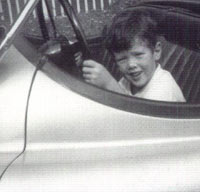 West Side Story topped his list of favorite musicals. “I think he was 12 when he saw it, and he adored that music – a lot of Broadway music – that’s why some of his songs had that quality.”
West Side Story topped his list of favorite musicals. “I think he was 12 when he saw it, and he adored that music – a lot of Broadway music – that’s why some of his songs had that quality.”
While the arts flourished, maintaining a stable home environment proved far more challenging. “I was just barely 17 when I ran off and married his father,” she recalls. “Then I had Bryan; I think I was 20 or 21.” The marriage ended two years later. “We broke up, and then I was alone with Bryan. He was two, two and a half. I went to my mother’s and stayed.”
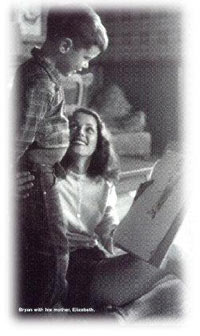 Eventually, a new man came into her life. “I was alone with Bryan for a season, and then I met Jack, who is Maria’s father.” He had little interest in raising her son; “He was very jealous; he was jealous from the time Bryan was a little boy. They say that happens with stepfathers.”
Eventually, a new man came into her life. “I was alone with Bryan for a season, and then I met Jack, who is Maria’s father.” He had little interest in raising her son; “He was very jealous; he was jealous from the time Bryan was a little boy. They say that happens with stepfathers.”
Bryan’s own father – an architect popular with the Hollywood elite – was out of the picture more often than not. When they did see each other, it wasn’t always healthy. “Bryan’s father spoiled him, but he didn’t give him that ‘father’ thing that he needed. And without that, your life is not what it should be.
“He suffered a lot. He was always trying to make a Pastor or an older gentleman in our church be his father. Always looking for a father, and it never happened. It’s very, very sad.”
Growing up in Beverly Hills, Bryan regularly rubbed shoulders with showbiz families. One of his best friends was Dean Martin’s son, Dino, and his first girlfriend was Liza Minnelli. “He would bring her over to the house. Bryan always called me ‘Honey,’ so she thought that was my name. She was so polite, she would shake my hand, and say ‘Thank you so much Honey, for allowing me to come into your home.’ Isn’t that sweet?”
No less an authority than Jack Nicholson advised him to pursue a career in acting. As a pre-teen, he had appeared in the 1957 Cary Grant/Deborah Kerr film An Affair To Remember, but had little interest in taking it further; outside a halfheartedly audition for the Monkees, he stuck with music.
By the time he joined Love, he’d already had a taste of life in the fast lane thanks to his stint with the Byrds. “He was the roadie. I don’t know what happened, but they were invited to England, and they told him he wasn’t going. It broke his heart, he didn’t know why. I don’t know whether he stole everybody’s girlfriends, or what he did.”
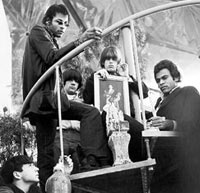 Signing on with Love offered the fledgling band instant credibility via his Byrds connection. For a few years, they were among the hippest of L.A. bands, in large part due to Arthur Lee’s at times bizarre behavior and larger-than-life persona.
Signing on with Love offered the fledgling band instant credibility via his Byrds connection. For a few years, they were among the hippest of L.A. bands, in large part due to Arthur Lee’s at times bizarre behavior and larger-than-life persona.
The dynamic between the two could be strained, bordering on abusive at times. In spite of a wealth of talent, MacLean allowed himself to be mistreated repeatedly, from the lack of his songs – no more than two per album – to the way he was treated onstage.
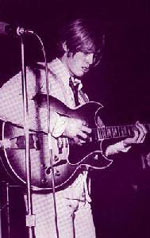 Elizabeth witnessed one of their earliest shows. “I had never seen them live, and I went to the Whiskey with some friends. I got right under Bryan’s nose, and Arthur kept saying to him; “Don’t play – you’re out of tune! Don’t play – you’re out of tune!” And Bryan just kept his eyes straight ahead and kept playing, and ignored him. But I was blown away when I heard the music.”
Elizabeth witnessed one of their earliest shows. “I had never seen them live, and I went to the Whiskey with some friends. I got right under Bryan’s nose, and Arthur kept saying to him; “Don’t play – you’re out of tune! Don’t play – you’re out of tune!” And Bryan just kept his eyes straight ahead and kept playing, and ignored him. But I was blown away when I heard the music.”
In Love Story, arranger David Angel recalls MacLean’s writing style; “What knocked me out in his songs was the unexpected; he could throw something at you. You didn’t expect it to be in that song, and yet it fit perfectly. This was a very fortunate combination, these two guys, I think. The difference was bigger than it appears on the records.”
In an interview with Richie Unterberger, former Love producer/engineer Bruce Botnick shared his perspective; “He was incredibly valuable…As deep as what Arthur was writing, I think Bryan was easily as deep, but coming from a different direction. I didn’t know it at the time, but a lot of things affected Bryan religiously, and caused him to go out and become a born-again Christian, and do that kind of thing for many years. I really liked Bryan. I thought he was very sensitive. I really liked his music…”
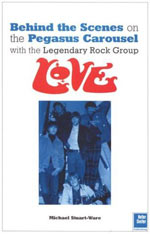 Love drummer Michael Stuart-Ware’s 2003 autobiography, Behind the Scenes on the Pegasus Carousel, puts it succinctly; “Remove Bryan from the mix and it wouldn’t be Love anymore.”
Love drummer Michael Stuart-Ware’s 2003 autobiography, Behind the Scenes on the Pegasus Carousel, puts it succinctly; “Remove Bryan from the mix and it wouldn’t be Love anymore.”
Michael was happy to expound for this feature; “Bryan’s contributions to the first three Love albums spoke to his talent. My favorite of his compositions has always been ‘Softly To Me,’ but all of Bryan’s songs demonstrated a mystically unique lyrical and musical phrasing quality that defies category, but is at once, both emotional and powerful.”
A full decade after the band split up, the dynamic between Arthur and Bryan had not changed. In 1978 the two performed together at the Whisky A Go Go. “Arthur would try to seduce him into doing gigs,” Elizabeth recalls, “and he finally did one, because he needed to pay the rent, and Arthur said he would give him $500.”
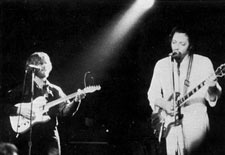
With Bryan onboard, it quickly turned into an event; Rhino Records even released a live album. “After they did the show, Bryan said; ‘Okay, give me my money.’ And Arthur said ‘F— you!’”
There would be no more reunions. “Bryan tried to stay away from him. I think that it was just too hard.”
When Lee passed away in 2006, Elizabeth attended his memorial with Bryan’s former bandmate. “I went with Michael Stuart-Ware. We’ve become really close; he’s like a son to me.” She was introduced to Lee’s cousin. “He’s an older man, and I started to weep. I said; ‘I’m so worried – did Arthur know Jesus?’ and he said; ‘Oh, of course he knew Jesus!’” He shared with her how Arthur would sing hymns with the family while growing up. “And I was crying. I was so worried.” She was moved by scripture Lee had designed for the service; “Arthur had put down the Psalms that he liked on the program, and they were very powerful.”
She’s struck up a friendship with his widow, Diane. “I’ve become friends with Diane; she’s a real good egg. She knew Arthur in a way that other people didn’t know him…she was very loyal to him, and she hates it when all these awful stories come out. She won’t allow anything negative to be said about him. She’s very, very serious about that.”
Some of the stories are undoubtedly true. “Well, he cheated all his bandmates; they thought they were signing to Elektra, and they were signing to him. He had a lawyer and he received all the money. What they were signing to, was Arthur’s deal with some lawyer.”
Owing to Bryan’s underage status, Elizabeth was required to be present. “He would have been 19, so I had to go there when they were all to sign. I was supposed to read the contract, and Bryan was embarrassed. Under his breath, he was saying; ‘Don’t read it! Don’t read it!’ He was so embarrassed that I had to be there,” she laughs. “He wouldn’t let me read it or anything.” Not that she could have understood the legalese, anyhow. “I don’t know if I would have been aware enough to pick up what was going on.”
Love Story features Elektra Records owner Jac Holzman recounting Lee’s insisting on a cash advance for signing with the label, whereupon he immediately bought himself an expensive two-seat import sports car – ostensibly, to move gear – and gave each of the other members $100.
After Love disbanded in 1968, Bryan began working on a solo album – first for Elektra, then Capitol Records. Neither was completed.
“He was messed up,” recalls Elizabeth. “It was terrible. They hired some guy to try to keep him from drinking.” His life was quickly devolving into an extended lost weekend, replete with drug overdoses and felony arrests.
According to MacLean, on August 8, 1969, he was invited to director Roman Polanski and his wife, actress Sharon Tate’s house in Benedict Canyon (Polanski was out of town at the time). It was the night of the Manson Family murders, and all four occupants were horrifically slaughtered. Had he accepted, there’s little doubt he would died along with the rest of the victims.
Meanwhile, significant changes were taking place back home. It started with Maria.
“We put Maria in a little Baptist school. The kindergarten teacher and her husband had been evangelists – they were very strong. And one day, I picked Maria up from school and she said “Mama, I love Jesus.” And my heart was struck.
“At that time the New Age thing was starting, and I was very caught up in that.” She had been introduced to Transcendental Meditation by her ex-husband’s wife, and was an enthusiastic convert. “Basically, I was searching; I was really searching.”
The family were Catholics, “but we didn’t go to Mass, necessarily, and we weren’t practicing. I always talked to Bryan about God, and his stepfather was also brought up a Catholic, but, you know,” she laughs, “it’s too hard to be a Catholic.”
Billy Graham was in Los Angeles not long after Maria said what she said in the car, and I put the television on and watched him. It was the first time I had heard the gospel.”
It was a profound revelation. “So I received Jesus that night. And of course, I put every bit of that New Age teaching down immediately…because I thought, ‘Where’s Jesus?’”
She joined a Bible study group. “I would get up at 5:00 in the morning and go meet some people at this little Baptist church in Santa Monica. We prayed for Bryan, and within a year, he was saved.”
In a 1997 BBC documentary, Bryan described the experience; “I wasn’t doing well, my mother had been converted…and she was praying for me, and one night in a hotel room in New York I just prayed; cried out to the Lord and said ‘If you’re real, I’m going to give my life to you, because I’m afraid I’m going to destroy myself.’”
Elizabeth was unaware of her son’s conversion – or his return to the West Coast.
“I opened the door, and there was Bryan, with his guitar in one hand and a suitcase in another. He put them both down and kissed me,” she recalls, “then he opened his suitcase and showed me the Bible which stated ‘Bryan Andrew MacLean, on the event of his salvation, December 1970.’”
He was one of the very first from the L.A. music community to embrace Christianity. His new songs focused on faith; but he chose to avoid working in the then-emerging contemporary Christian music industry – which would have afforded instant popularity.
“You know what? That was suggested to him. A lot. But, I don’t know if you’ve been around the Christian music industry…” Elizabeth hesitates. Could it be its reputation as an inherently corrupt system? She laughs; “Okay, there you go. That’s why.
After his return, “he lived with us for three years. Maria was around six, and he used to sit and sing to her.” As time went on, her talent blossomed. “When she was fifteen, he realized that she was gifted, and he took her in the studio.”
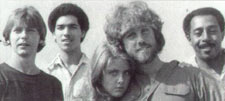 In 1980 he started the Bryan MacLean Band, which lasted for just over a year. “He made a little band for her,” their mother recalls.
In 1980 he started the Bryan MacLean Band, which lasted for just over a year. “He made a little band for her,” their mother recalls.
“He made a band for her before she got signed. He wanted to call it the Maria McKee Band, but she wouldn’t let him do it; she was too shy.”
The group – performing Bryan’s songs – only played a handful of shows. Those that caught them live were impressed. “There was one fellow who came from England. He wrote a review, and said it was one of the greatest thrills of his life.”
She has many fond memories of the period, including the shared sense of humor. “He and Maria and I – and this is when we’re all grown up – if we were out at a restaurant eating, they’d act up like kindergarteners. They would take the bread and mould it, do sculptures, dip it in the water, and I’d have to get up and leave. She had one girlfriend that started to cry, and had to leave; she couldn’t take it. They were like two little brats.”
In addition to mentoring Maria, Bryan was an early supporter of Leslie – later Sam – Philips. He discovered her at The Hiding Place, converted nightclub run by the church. “Bryan would sing and was worship leader there, and he discovered Lesley. She came and tried out, and he saw her talent.” On occasion, all three – Maria, Bryan and Leslie – would sing together.
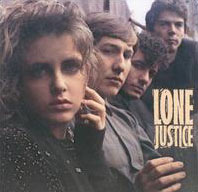 In 1982, Maria formed Lone Justice. Their mix of roots rock and country immediately found favour with critics, and many saw them as the next big thing. One of the debut album’s most popular tracks was Bryan’s ‘Don’t Toss Us Away.’ It almost didn’t make it onto the album due to Maria’s insistence on not recording the song.
In 1982, Maria formed Lone Justice. Their mix of roots rock and country immediately found favour with critics, and many saw them as the next big thing. One of the debut album’s most popular tracks was Bryan’s ‘Don’t Toss Us Away.’ It almost didn’t make it onto the album due to Maria’s insistence on not recording the song.
“A sister in the Lord and I got on our knees and prayed, because Maria didn’t want to do it,” says Elizabeth. “Everybody loved that song so much…I know her producer really got on her to do it”
She relented, but refused to even consider singing any more of her brother’s songs. The decision led to a deep rift within the family. “Maria was being successful, and of course, I had to be with her, because she was so very young. She wasn’t doing his songs, and he got very, very hurt, and kind of bitter, and he actually kept himself away from us. I was thinking about that this morning, and I thought, the poor guy; I don’t blame him. Here he is, this genius with all this music, and she’s not doing it, and she could do more.
“He was always sad, because he felt she was the perfect interpreter of his songs, and she just wouldn’t do them – she just wouldn’t record them. I don’t know if it was the advice of [record company head] David Geffen, or whether it was her.
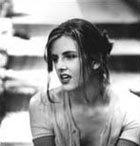 “You know, they were funny with each other. I remember one time Maria said to me; ‘I can never live up to what he was.’ I said; ‘What are you talking about!? Aw, come off it!’”
“You know, they were funny with each other. I remember one time Maria said to me; ‘I can never live up to what he was.’ I said; ‘What are you talking about!? Aw, come off it!’”
The animosity ran both ways. “Not long before he died, Bryan said ‘You know, I love Maria, and I’d do anything for her, but I don’t like her.’” Elizabeth is clearly saddened by the statement. When I observe that Bryan’s remark could be perceived as healthy; that it takes a long time to realize you can love someone and not necessarily like them, she lets out a laugh; “That’s classic of you; you don’t know how good that makes me feel.”
Maria’s recent live Cd, Acoustic Tour 2006, includes three of Bryan’s songs. “I know! Isn’t that amazing? She did that on her own, because I never would have approached that. I never would have said ‘Oh, you should do some of Bryan’s songs.’ But I always tell her how happy it makes me when she does it.’
Lone Justice broke up without ever realizing their commercial potential. “She ruled the roost,” Elizabeth laughs. “They thought they were going to make billions on her. But the thing was, she never played their game. She was never sexual on the stage.
“She was adorable. She was just darling, and she was a Christian girl, you know. And then, through the years, she probably got into some of the bad stuff, but she got out of it. I mean, God sent this man who became her husband, who’s a mother’s dream.”
Elizabeth is particularly fond of her son-in-law, Jim Akin (“the most wonderful man, who’s a Christian, and a master musician as well”), and makes a point of mentioning his solo CD. “It’s called The Shootist, and I think it’s genius. I went crazy over it. I tried to get it to a guy who puts songs in films, and he didn’t get it…he said he didn’t think it had anything for him, which I just thought was crazy. I wish I had a movie – I’d put it in!”
With Bryan’s recent induction into the Grammy Hall of Fame (for his contribution to Forever Changes), she’s hopeful her daughter will someday be similarly honored. Since Lone Justice, Maria has recorded a number of well-received solo albums. 2005’s Peddlin’ Dreams is one of Elizabeth’s favorites. “I listened to the album, and I thought, ‘This is absolute genius.’ I was so emotionally caught up in it. One of the songs, ‘Appalachian Boy,’ is so poignant, I just cry every time I listen to it. I don’t know why she’s never gotten a Grammy. I mean, these songs are so unbelievable. But she never played the game; she was never a sexpot.”
Elizabeth is realistic regarding her son’s substance abuse, which he struggle with throughout his life. “Bryan is a product of the sixties. And Love, well, they all started drugging. There was everything in those days. Arthur always had a hash pipe lit, and that’s how it started. And he had a provider of his drugs that taught all the guys how to shoot up.”
Chances are Bryan was well along that path before joining Love; his work with the Byrds, and an even earlier friendship with David Crosby – whose excessive binges were legendary – surely presented numerous opportunities to indulge. “He probably was smoking. The drinking I’m not too sure, but everybody was smoking marijuana.”
He dabbled in everything, but alcohol eventually became his drug of choice. A bi-polar disorder only exacerbated matters.
In Pegasus Carousel, Stuart-Ware quotes Lee, indignant upon discovering MacLean drinking during a rehearsal; “What’s the matter with you, man? Why are you bringing that stuff around here?…We’re a drug band, fool, not a beer band. You trying to blow the image?”
At times, encouragement came from unlikely sources. “I remember Maria and I were invited to the first Farm Aid [1985] where she sang with Lone Justice.” Former Byrd Roger McGuinn – who had embraced Christianity in 1977 – was also on the bill. “Roger came up and talked to me about Bryan. He wanted to know how he was, and he said; ‘I want you to know that I pray for him.’ So sweet.”
At one point doctors prescribed medication as a preventative measure. “They gave him lithium, and it ruined him. It blew him up like a balloon. He said he was like an old man, he’d have to get up and pee all night. He finally took himself off of it, and of course he started self-medicating again.” For those who suffer from bipolar disorder, it’s quite a common reaction. “It’s very standard; they self-medicate. Both my children are bipolar, so that kind of goes with the territory.”
Maria has discussed her condition publically on occasion, but declined an interview request via Elizabeth for this story; “It’s still too hard for Maria. She is still sad.” She is the author of TV Teen, an autobiographical play about a young girl growing up while watching over her bi-polar older brother.
“Maria was mostly in the depressive side. Fortunately, she married Jim. The way they found out that Maria was bipolar was that she was in bed for three months, watching TV. And then at the end of three months she turned it off and turned her head to the wall. And so he finally said ‘That’s it, I’m taking you to the doctor.’
She’s convinced her daughter’s condition has impacted their own relationship. “Through the years I’ve gone through so much hurt, with some of the things she said to me, and the way she rejected me. But God’s helped me through this. I began praying for her, and stopped feeling sorry for myself.”
The decision brought about a radical change in perception. “It was prayer. And I understand her, you know, her good and her bad.”
The situation continues to improve. “She recently started thanking me for things. One day I was over there and she said ‘I want to thank you for always supporting my music.’ And she’s gone back to flamenco; I took her when she was a little girl. She’s been going to some classes again. She calls me up, and says; ‘I just want you to know how grateful I am that you gave me flamenco. I can’t tell you how happy it makes me.’
“But you know what’s funny? She was so in love with me when she was little. I made a whole book of love notes. It’s thick!”
In 1989, singer Patty Loveless recorded Bryan’s ‘Don’t Toss Us Away,’ taking it all the way to the top ten on the country music charts. “He loved her version,” Elizabeth recalls, “he liked it better than Maria’s.”
The windfall proved to be a mixed blessing. “He said it almost financed his death. Bryan was paid a half a million, and he wasn’t doing well. He was taking trips to Hawaii. I don’t think it was a very good time.”
By the early nineties, things had gone from bad to worse. “I was on staff at a church in Anaheim, California – one of the Vineyards. And I would drive up to see Bryan, and one day the landlady came up to me – she’s Italian – and she said “You need to come here. You son, he needa you.”’
She decided to get directly involved. “I went back down to the church, and I talked to the Pastor and he was very upset with me. He said ‘You know you can’t save your son.’
“But I came. I looked Bryan in the eyes and I said ‘I’m not leaving you. I love you.’ And so we had four years together. The last four years I was here with him. He lived in an apartment upstairs, and it was wonderful in some ways, hard in others. I got him into Victory Outreach, which was an offshoot of Teen Challenge. He was there 18 months.”
While her son was away in treatment, Elizabeth stumbled upon a treasure trove of tapes. “What happened was, I got Bryan into Victory Outreach, and he left his apartment. So I went to clean up his garage, and there was a box up high, and it was all his early music. That’s how I found them – because I had to clear everything out of his garage.”
There were demos for Love, material from his aborted solo albums, and more. She got in touch with Sundazed Records, a respected label based out of New York state that specializes in hi-quality reissues. “I called up, and they called back so fast; “Yes! We wanna do it! Send the masters!” And the masters,” she laughs, “were a pile of cassettes.”
After returning home, things improved markedly for Bryan. He rarely wavered from his daily routine. “We lived below Griffith Park. The observatory is at the top of the hill, and he ran up to the observatory every morning. He used to get up around 3:30, run up that hill just in time for the dawn, and sing to the Lord while it was still dark. He said that sometimes there were deer families that would come around him.
“Then he would come down, whistle at my window, we’d sit and talk. And I think we helped each other.”
During Bryan’s stay in rehab, Maria found support through a twelve-step program. “She went through the whole thing; she really believes in it. She sent me a book, and said ‘You need this, because you’re co-dependent with Bryan…”
Part of her recovery included severing ties with her brother. “It was the four years that she stayed away from us – the time he was here.” Elizabeth admits she’s still mystified by her daughter’s decision. “It was really ridiculous of her. She said ‘I can’t be around it. I’m working on my own issues…’ I think about it every day, and I think that she missed out.”
They saw each other one last time in the fall of ‘98. “I took her to his church one Sunday. It was his birthday, so it was just a couple of months before he passed away. I wonder if she ever thinks about the time she stayed away.”
Bryan was opposed to the entire twelve-step philosophy. “He said ‘I believe that you have what you say…life and death are in the power of the tongue. I’m not going to stand up and say ‘I’m an alcoholic and I have no control,’ or something about the higher power – that little speech you have to make.’ And he just wouldn’t do it. He tried it, but I think for him it was a type of panacea for the moment. He said everybody smoked and everybody had sugar, and everybody drank coffee.”
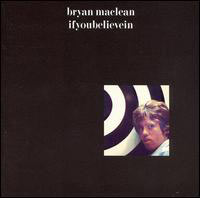 In 1997, Sundazed released ifyoubelievein. It was a tantalizing look of what could have been, with songs every bit the equal of the handful his reputation rested on, and was met with glowing reviews. “I’m so thankful that Bryan was able to see what happened with that first album,” Elizabeth admits. “He had been broken-hearted for so many years about his music, and he got to see that people cared. I mean, it wasn’t a smashing, smashing success, but it was so appreciated, and the reviews were good. He got a lot of hurrahs.”
In 1997, Sundazed released ifyoubelievein. It was a tantalizing look of what could have been, with songs every bit the equal of the handful his reputation rested on, and was met with glowing reviews. “I’m so thankful that Bryan was able to see what happened with that first album,” Elizabeth admits. “He had been broken-hearted for so many years about his music, and he got to see that people cared. I mean, it wasn’t a smashing, smashing success, but it was so appreciated, and the reviews were good. He got a lot of hurrahs.”
The label was thrilled to be working with Bryan. “Bob Irwin, the President of Sundazed, is just a fiend on reissues. So he was in heaven. They had come out to L.A. three months before Bryan died and we had a meeting. Up to that point we hadn’t met with them face to face. At the meeting, Bob said ‘I want to take you to London and do one of the Royal Halls.’ [Arthur Lee would perform Forever Changes at the Royal Concert Hall in 2003]. And Bryan didn’t say anything. And I was sort of excited about it. That next morning, when Bryan came by – he used to finish his run about 6:15 – he said ‘Look; I want you to know that I’m not going to go to England, and I’m not going to do those songs. Intra Muros is what I care about. It’s who I am.’”
Intra Muros (the title translates as “Inside the Wall) was his ‘real’ solo album, a collection of 14 worship-oriented songs he had been working on for the previous two years. “And he said ‘My deepest longing is that Intra Muros touches lives and changes them.’ Isn’t that amazing? He didn’t want that old awful stuff.”
Not that he was dealing with shady characters. “I think if Bob did it, it wouldn’t be the nasty thing like Love was. It didn’t have to be that way. But Bryan still wasn’t interested. He only cared about Intra Murals.”
During the fall of 1998, she became troubled by her son’s appearance; “His face would be dark red, and I didn’t know what it was.” Despite her apprehension, he remained unphased; “He was one of those people that wouldn’t see a doctor because he believed that Jesus was his healer. Period. Bryan used to look at himself in the mirror and go; ‘Bryan, you have perfect health.’ That was his positive word from the Lord.”
He died on Christmas day. “The day that he died, he picked up a friend and they drove up the coast to see Bryan’s cousin. All the time they were driving, Bryan had his worship music on, and was singing at the top of his lungs. So God was drawing him.
“He called me from a restaurant where they were having Italian food. He says ‘Guess where I am?’ He and Maria and I used to eat there. He told me where he was, and asked if I was okay.”
She had expressed concern over his condition that morning, “because something was funny; he was running, and he didn’t look well at all – he didn’t look right. So, he calls me, and we chatted for a little while. He wanted to be sure I was okay. And then in about an hour, I got a phone call from the fellow that was with him, who said that he dropped dead in the Men’s Room.”
The fact that he was singing throughout the day, and spoke with her directly before his passing reinforces her belief that the events were preordained. “I totally believe that God just took him home – the Lord just called him. I mean, the way he went; he didn’t have a bad disease, he didn’t suffer in a hospital, he just went up.”
He was sober when he died, but in far from ideal physical shape. “Well, what happened was he had hardening of the arteries, and he had cardiomyopathy. He had a weight problem from the time he was a little kid, and when we cleaned his apartment, everything he shouldn’t eat was in the refrigerator. Bacon, eggs, cheese, pop… “
Elizabeth has nothing but praise for her daughter, who, in the wake of the tragedy, offered unflagging support. “I called Maria. She was down south with her husband and his folks, and they came right up to see me, and I have to say that they were with me for one full year. They helped me through the first year of his passing. They would come and take me for dinner, and Maria took me for massages, I mean, it was just wonderful.”
More of Bryan’s music has become available since his death.
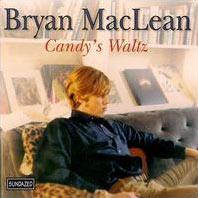 In 2000, Sundazed released Candy’s Waltz, a second collection of garage tapes every bit the equal of ifyoubelievein. ‘Husband and Father,’ from 1971, is reminiscent of Carousel’s ‘Soliloquy.’ Sung from an expectant father’s perspective, it reflected a dream he never realized.
In 2000, Sundazed released Candy’s Waltz, a second collection of garage tapes every bit the equal of ifyoubelievein. ‘Husband and Father,’ from 1971, is reminiscent of Carousel’s ‘Soliloquy.’ Sung from an expectant father’s perspective, it reflected a dream he never realized.
The disc concludes with an interview conducted in early 1998. With equal parts humor and humility, MacLean offers unflaggingly honest responses. Queried as to where he would like to be in ten years, he refers back to that longstanding ambition; “…even though I’m a half a century old, I don’t think that there’s any problem with thinking that I could meet somebody and start a family.”
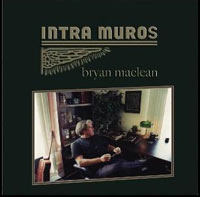 Elizabeth has overseen the release of three Cds on her own.
Elizabeth has overseen the release of three Cds on her own.
She’s most excited by Intra Muros, which she refers to as ‘Bryan’s masterpiece.’ MacLean described the absolutely unique blend of gothic rock and jazz as “spooky worship music.”
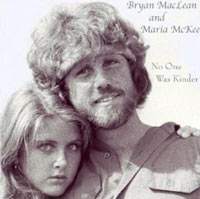 Credited to both Bryan and Maria, No One Was Kinder features the two singing Bryan’s songs in the early 80’s. “It was a little cassette player. It’s amazing that it’s as good as it is – we got it not too bad, considering.”
Credited to both Bryan and Maria, No One Was Kinder features the two singing Bryan’s songs in the early 80’s. “It was a little cassette player. It’s amazing that it’s as good as it is – we got it not too bad, considering.”
Praise and Worship is a double disc of exactly what the title implies; some alone on guitar, others with full production. Even here, the Broadway influence that permeates his entire catalogue is obvious, with many of the songs sounding like show stoppers from another era.
Due to a lengthy history of relapsing, friendships were often tentative with members of the church, “He was very lonely, because a lot of his fellow Christian brothers didn’t have anything to do with him anymore. It was really sad.”
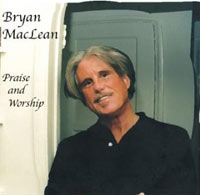 He never cut himself off of the outside world, and while he struggled with those who shared his beliefs, he was loved by many outside the church. “It’s clear that those who knew him – or knew him through his music – were deeply impacted.”
He never cut himself off of the outside world, and while he struggled with those who shared his beliefs, he was loved by many outside the church. “It’s clear that those who knew him – or knew him through his music – were deeply impacted.”
Michael Stuart-Ware remembers fondly their time together; “His profound intelligence lent itself to Bryan’s everyday life. I never once saw him lose his temper. No reason to get mad, no matter what happens. Anger is counterproductive. Life is to be enjoyed and people? Like he said; ‘…people are the greatest fun.’”
Through it all, he retained his faith. “He never stopped writing worship music. When he passed away, there were hundreds of cassettes – hundreds of cassettes. In his loneliness, he never stopped writing. I think Bryan’s comfort and relief was in writing worship music. There’s one song on the double album called ‘Is This The Thing They Call Glory?,’ and I think that is so poignant, because I think it’s his heart.”
In addition to recording Intra Muros, Bryan had been writing a book when he died. “He only got to a few pages of the third chapter. It’s pretty amazing; his views on things. He talks about self-forgiveness, and can you imagine the turmoil he must have been in? To be born-again, and have the Lord, and be a worship leader and then fall? And keep falling? Getting back up, and then falling again?”
Self-forgiveness was a tough concept. “It was a struggle for him. He said that one of the things God showed him when he started this process was that he has to realize that he’s forgiven, and he had to forgive himself.”
Elizabeth admits it’s only in the last decade that she has started to come to terms with some of her more questionable parenting decisions.
As an example, she brings up Bryan’s childhood weight issues; “I think a lot of kids eat because they’re starved for that thing that they need; their parents. And I was so scared of [second husband] Jack, that I had to stand with him against Bryan. It was the worst thing. That was the sadness of my life, to have to gang up on him.”
It was the opposite scenario with Maria. “I was in such La La Land. I thought; ‘Oh, the Lord gave me my little girl! I always wanted a little girl; I’m going to be the perfect mother of a perfect child.’ And then I just loved her. I took her everywhere, because Jack was never home, and she had no daddy, so I tried to be everything to her, and do everything. And a lot of it was good, but a lot of it was bad, because I was in another world. She was my life – I made her my life.”
“I think it’s been in the last few years, since Bryan died, that I’ve been able to be honest with myself, and who knows, maybe that whole attitude that I had towards her, of making her my little Princess and all that, is what screwed her up.”
She reflects on the entire family; “I think it’s amazing what we’ve come through, all of us. Everything seemed so terribly dramatic.” Alongside an abundance of talent, she laughs, “We got genetics that we didn’t want.”
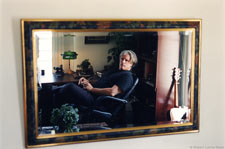 She accepts responsibility, but doesn’t dwell on past mistakes. The concept her son struggled with – self-forgiveness – has enabled her to move on. “Well, I’m so into the blood of Jesus covering me… I get it and I’ve got it. He knows I can be naughty and he laughs at me and he says ‘Okay honey, it’s okay.’ Not,” she clarifies, “that he’s winking at my sins. It’s an intimate relationship that I have with him now.”
She accepts responsibility, but doesn’t dwell on past mistakes. The concept her son struggled with – self-forgiveness – has enabled her to move on. “Well, I’m so into the blood of Jesus covering me… I get it and I’ve got it. He knows I can be naughty and he laughs at me and he says ‘Okay honey, it’s okay.’ Not,” she clarifies, “that he’s winking at my sins. It’s an intimate relationship that I have with him now.”
When I invited Michael Stuart Ware to share thoughts on his old bandmate, not surprisingly, he referenced the family; “Where did Bryan get what made him special? Heredity? Environment? Some of each, probably. His mom, Elizabeth is a professional flamenco dancer, accomplished artist, philosopher and scholar…a beautiful human being with an unequaled sense of humor. And just imagine, two children, and both achieved great success in the incredibly difficult arena of professional music. Not many mothers in that club.”
Her enthusiasm throughout our conversations is hard to square with the notion of an 82 year old. Elizabeth laughs. “Well, I’m still young. That’s what’s so crazy about it. And you don’t know what God has done for me. For the first time in my life, I have more than I need. My basic needs and my rent, food and whatever else you need to pay; now I have over. He just keeps pouring it back. It’s just more to give, and you can’t out give God.”
© John Cody 2008